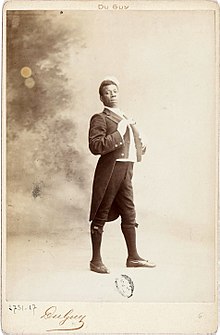Chocolat (clown)
| Rafael | |
|---|---|
 |
|
| Born |
c. 1865–69 Cuba, Spanish Empire |
| Died | November 4, 1917 (age 48–52) Bordeaux, France |
| Other names | Chocolat |
Chocolat was the stage name of Rafael, a clown who performed in a Paris circus around the turn of the 20th century. Rafael was of Afro-Cuban descent and was one of the earliest successful black entertainers in modern France. He was the first black clown to play a lead role in a circus pantomime act, and with his longtime partner George Foottit they revolutionized the art of clowning by pairing the sophisticated white clown with the foolish auguste clown.
Rafael was born is Cuba sometime between 1865 and 1869. He was likely born a slave, which would explain why his birth was not registered. If so, he was probably born before September 17, 1869, because in 1870 the Spanish government emancipated all slaves born from that date onwards (see the Moret Law). He was born without a surname; "Padilla" was but one of several he would adopt later in life. Rafael had no memory of his biological parents. He was raised by a poor black woman in the slums of Havana. When Rafael was still a boy, she sold him to a Spanish businessman named Patricio Castaño Capetillo for 18 ounces of gold.
Castaño brought Rafael to his family's household in the village of Sopuerta in northern Spain. Cuba had banned the slave trade in 1862, and under international law Rafael technically ceased to be a slave at all the moment he set foot on European soil, but nonetheless the Castaños treated him like one. The Castaños, like many Spaniards with colonial connections, were anti-abolitionists and flouted the law by declaring Rafael a "servant". Rafael was the only black person in the village, and was mistreated both by the Castaños and the villagers. They made him sleep in the stables, and gave him no education.
At around the age of 14 or 15, Rafael fled the Castaños. He worked in the quarries of the Basque Country, then moved to Bilbao where he worked odd jobs, such as dockworker, then as a porter at the train station. In Bilbao he met Tony Grice, a travelling English clown, who hired him as an assistant and domestic servant. Grice would occasionally incorporate Rafael into his acts, such as in his parodies of American minstrel shows, but didn't make Rafael an apprentice. Rafael did not enjoy this life: on several occasions he deserted Grice, then returned when he could not find employment elsewhere.
...
Wikipedia
